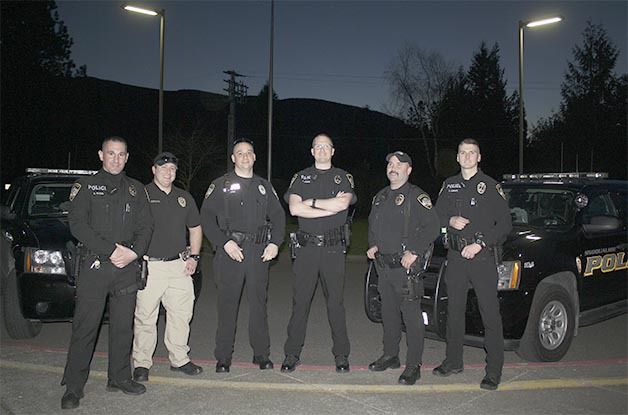For the new cops in North Bend, there’s no substitute for boots on the ground.
So Snoqualmie Police Chief Steve McCulley had the six officers assigned to his department’s inaugural North Bend police patrol, plus extra officers from the home station, park their cars whenever possible and hit the streets and shops for some old-fashioned community policing.
“We’re going business to business,” said McCulley, the 20-year North Bend resident and former Snoqualmie Police captain who took over as chief two years ago.
When they meet someone, his officers start asking questions: “How can we help you? What are your issues? What are your concerns?”
North Bend’s new police are making those contacts and hearing those concerns, when they’re not responding to calls. While Snoqualmie was quiet in the first week of the contract, while North Bend got a flurry of requests for help, and one major, violent crime that sparked an ongoing investigation.
On day two of the North Bend contract, which began at midnight Friday, March 7, a woman working late at a restaurant on Mount Si Boulevard, a few blocks from Interstate 90, was attacked, stabbed, tied up with duct tape and sexually assaulted. Police are making progress in the case, but the incident in North Bend rattled residents and employees, some of whom shared their concerns at a March 12 meet-and-greet session for the new force at North Bend Elementary.
Increased presence
Employee safety, crime, drugs and transients loomed large in the concerns of locals whom police contacted in their first week on the job.
Patrol officer Todd Olson, a 10-year cop who Snoqualmie hired from Mercer Island, focused on the downtown train depot in his first week.
“We heard it was a bit of an issue”—the depot, with its public bathrooms, next door to a convenience store, being an occasional hang-out for transients, Olson said.
Residents and business owners told Olson they are excited he and his fellow Snoqualmie officers are here.
“They want to see us out there, talking to people,” he said. “They want to know that we’re here and have a vested interest in the community. We’re trying to communicate that as best we can.”
Until this month, North Bend’s law enforcement had been provided, for four decades, by the King County Sheriff’s Office. The city made the change to Snoqualmie to get a deeper officer presence.
North Bend will have at least one officer on duty at all times, backed up by two patrol officers, and often three, from nearby Snoqualmie.
North Bend City Administrator Londi Lindell calls the new arrangement a win for both city and county residents.
“You’re actually getting an increase,” she told a Wilderness Rim resident. “We’re all winning. We’re getting more officers.”
The city lobbied hard for the sheriff to keep a two-officer presence in the county, post-March 7, Lindell added.
Snoqualmie has hired five officers, and two more will come online by summer.
“In this past week, we have supplemented and hired overtime to ensure response during the busy times, early evening and the early-morning graveyard shirt,” said Capt. Nick Almquist.
The two cities agreed to a contract in 2013 for police services, costing North Bend about $1.3 million annually. Salaries, benefits, vehicles, uniforms, equipment, and all other expenses incurred for these services will be paid for by North Bend. North Bend is paying for their share of dispatch and records management, jail, court, prosecutor, and public defender costs. No North Bend services are funded from the city of Snoqualmie budget.
Besides police on the street, the people taking 911 calls also changed for North Bend. But it may take time for the city’s new 911 dispatchers, based in Issaquah, to master the local geography.
Asked by resident Dave Olson about whether North Bend’s growing population is responsible for perceived increases in crime, McCulley answered in the negative. In this city of 6,500 people, which is expected to grow to 10,000 by 2017, most citizen complaints are about increased drug use, and the petty crimes and thefts that go along with that.
Transient attention
At the town meeting, McCulley addressed perceptions that North Bend is unsafe, admitting that he’s heard from several neighbors about how they’re thinking of moving.
“North Bend has, unfortunately, been the victim of strange incidents, like Peter Keller and the bunker (in 2012), home invasions (in 2013), even though they are very rare,” the chief said. “We are fortunate to live in a safe part of King County.
“But it’s very concerning to me that people don’t feel safe,” he added. North Bend’s winter shelter, designed to help the homeless, has brought positives as well as negatives, McCulley said, possibly attracting “an element… that we need to deal with.”
“It isn’t about kicking them out of their camps, completely, “ he said. But police will contact transients or homeless and intervene if necessary. McCulley starts with questions: Why are you here? Do you have the resources you need? How can we help you?”
Working with North Bend city and public works officials and the Friends of the Trail private clean-up group, McCulley has already visited a few of the city’s half-hidden transient camps. The idea is to get them cleaned up, “because they’re a disaster, they’re dangerous.” He wants to find out who lives in the camps, then either get them to the resources they need, or get attention from police.
“Half the battle is us getting to know you, and for you to get to know us,” McCulley told residents. “Those that don’t want to get to know are going to get to know us, and they’re probably not going to like it.”
Don’t get me wrong, everyone has constitutional rights and a right to be treated professionally. But those who choose to live a life of crime, were not going to tolerate it. We’re going to get a handle on it.”



